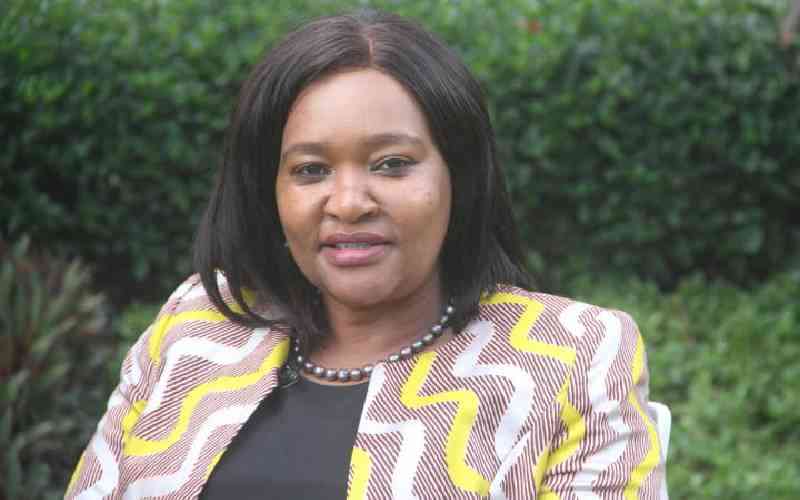By Pauline Rose
The figures in the recently published Education for All Global Monitoring Report are a sad indictment on how we continue to fail children around the world. In our report we reveal that one in three young people in sub-Saharan Africa have never completed primary school. While in Kenya the figures are better, still one in ten young people lack the skills learnt at primary school and are struggling to find dignified work. And those who are most likely to lack these skills are from the poorest households, either living in urban poverty or in rural areas. One in three young women living in rural Kenya has spent fewer than four years in school.
But if governments believe that education is merely a problem for the education ministers to solve, then they are wrong. In today’s global economy, failing to provide proper education will undermine economic growth, reinforce social inequalities and mean those running businesses do not have a skilled work force they need.
In many ways, the past decade has been a good one. Africa’s economies are growing consistently faster than any other region. In 2011 Ghana had the highest rate of growth in the world. From 2005-9, Ethiopia even recorded higher growth than China, and Uganda outperformed India. The World Bank estimates that more than a third of the countries in the sub-Saharan region achieved growth rates of at least 6%.
Yet governments will be fooling themselves if they think that such growth can be sustained in the long term through the notoriously volatile exports of oil, minerals or agricultural products. This growth surge can only be sustained if we learn lessons from places like the Republic of Korea; the country went from being poor to wealthy in the space of 30 years because of emphasizing developing skills among young people.
As the Global Monitoring Report reveals, investing in schoolchildren and students represents a sound financial opportunity. If 75% more 15-year-olds reached the most basic benchmark in maths, economic growth could improve by 2.1%, and 104 million people could be lifted out of poverty. We’ve seen it work on the small scale already: In Kenya, Uganda and the United Republic of Tanzania, famers benefiting from field schools saw their crop value per acre increased by 32% on average, and by 253% for those who had not had any formal schooling. Income increased by 61% on average, and by 224% for households where the farmer had no previous schooling.
Before the good news, however, we must look at the facts in the report. 250 million children of primary school age today cannot read or count whether they have been to school or not. We know that the poorest make up the majority of this headcount as well. Among grade 3 students in Kenya, only 28% of students from the poorest fifth of households had attained the expected numeracy skills from school compared with 48% of the children from the richest fifth. It is not clear how this generation of children will fill roles in knowledge based economies unless there is a change.
So we need to make it easier for more children to go to school, no matter how disadvantaged they are – and ensure that they learn more when they do. Alongside the efforts made to abolish secondary school fees in Kenya, we also need to see classrooms built closer to the communities that they serve. One million children are still out of school in Kenya- the ninth highest figure of any country in the world. Many live in urban poverty, with 60% of Nairobi’s inhabitants living in slums. Many young people in these slums can’t go to school for the simple reason that there aren’t any schools available. The lack of education and training opportunities severely limits their work opportunities: about 50% of men and 80% of women aged 15 to 24 have no income-generating activities.
For those who have seen the school system fail them already, we also need ‘second chance’ programmes to ensure young people have the skills they need. There are encouraging signs here. In Malawi, where only half of children manage to complete primary school, as many as 10,000 students have taken part in such a scheme; half of those so far have either completed the course or returned to primary school
Donors also need to fulfill their promises, however tempting in these tough times; it is to cut back on aid. We need US$16 billion a year just to keep the Education for All promise made in 2000 that by 2015 all children are able to complete their primary education. To achieve universal lower secondary school enrollment would cost a further US$8 billion.
That sounds like a lot of money. Yet simply by reallocating aid, some of the gap could be filled - US$3.1 billion alone could be used to help post-secondary education in developing countries rather than being used to fund students studying abroad. To put this in perspective, for the amount it costs for one Ghanaian student to study on scholarship in Japan, 72 young people could have accessed secondary education in Ghana.
How important is it to invest in skills training from disadvantaged youth? It is vital. Learning will drive economic growth, fuel innovation and create jobs. Better education will equip Kenyans and other Africans with the skills they need to escape poverty and build more prosperous countries. And it will empower many, by helping them enjoy secure livelihoods and give them the chance to participate in political processes.
We have to take action now. By 2030 there will be three and a half times as many young people in sub-Saharan Africa as there were in 1980. We cannot afford to fail another generation.
The 2012 Education for All Global Monitoring Report will be launched in Nairobi on 16 November 2012. Prior to the launch UNESCO, in partnership with the University of Nairobi, Kisii University College and Kenya National Commission for UNESCO, are organizing two open forums to generate a dialogue on the theme of youth and skills in Kenyan context amongst policy makers, the academic community, employers, students, and listen to the voices of the youth in particular. Outcomes of the two open forum events will feed into not only the official launch of the Report but also a technical panel discussion to take place on 16 November 2012.
Pauline Rose is the Director of the Education for All Global Monitoring Report, UNESCO, Paris.
Stay informed. Subscribe to our newsletter
 The Standard Group Plc is a
multi-media organization with investments in media platforms spanning newspaper
print operations, television, radio broadcasting, digital and online services. The
Standard Group is recognized as a leading multi-media house in Kenya with a key
influence in matters of national and international interest.
The Standard Group Plc is a
multi-media organization with investments in media platforms spanning newspaper
print operations, television, radio broadcasting, digital and online services. The
Standard Group is recognized as a leading multi-media house in Kenya with a key
influence in matters of national and international interest.
 The Standard Group Plc is a
multi-media organization with investments in media platforms spanning newspaper
print operations, television, radio broadcasting, digital and online services. The
Standard Group is recognized as a leading multi-media house in Kenya with a key
influence in matters of national and international interest.
The Standard Group Plc is a
multi-media organization with investments in media platforms spanning newspaper
print operations, television, radio broadcasting, digital and online services. The
Standard Group is recognized as a leading multi-media house in Kenya with a key
influence in matters of national and international interest.








